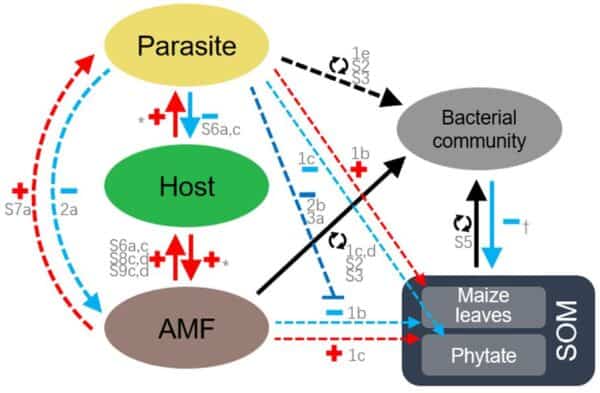1. Parasitic plants have been shown to affect soil-organic-matter (SOM) decomposition, but the mechanism is unknown. As arbuscular mycorrhizal fungi (AMF) can affect decomposition and compete with parasitic plants for carbon, we hypothesized that parasitic plants can indirectly regulate SOM decomposition by suppressing the effects of AMF on decomposition.
2. To test this hypothesis, we conducted two container experiments in which the herbaceous plant Bidens pilosa was inoculated with the AMF Rhizophagus intraradices or not, and Cuscuta australis or not. In one experiment, we provided SOM within hyphae-in-growth bags as 13C-/15N-labelled maize leaves and in the other experiment as phytate-P. We assessed growth and nutrient uptake of B. pilosa, growth of C. australis, the SOM remaining in the hyphae-in-growth bags, and the bacterial communities.
3. Parasitization increased the 13C and decreased the organic P remaining in the bags, but only in the presence of the extraradical AMF hyphae. AMF decreased the 13C and increased the organic P remaining in the absence of the parasite, but not in the presence of the parasite.
4. Our results demonstrate that parasitic plants can regulate the decomposition of organic materials indirectly by suppressing the effect of the extraradical AMF hyphae on decomposition. In other words, parasitic plants can regulate SOM decomposition indirectly via a multitrophic cascading effect. Our study helps to unravel the mechanisms of a sophisticated hidden ecological process, and is an important step forward in elucidating the roles of parasitic plants in soil nutrient cycling.
Functional Ecology 37: 302–314 , 2023.
